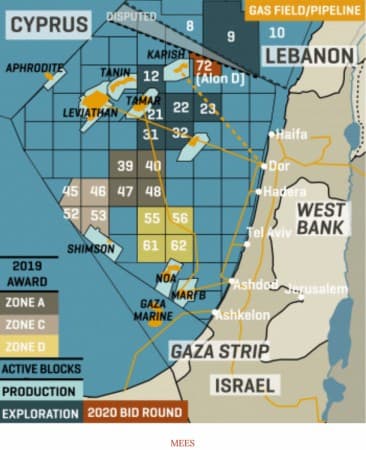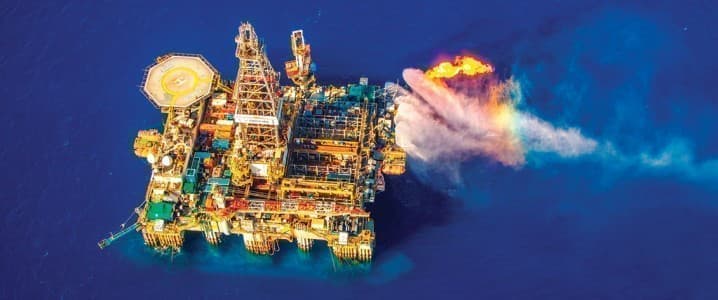The 2020 gas price crunch has substantially cooled down the hype around the Eastern Mediterranean’s recent discoveries in Egypt, Israel and Cyprus. Israel was the first EastMed nation to commission an offshore field and has scored some genuinely impressive discoveries in Leviathan and Tamar, however the string of new finds has largely dissipated and erstwhile ambitious plans to become the gas hub of the Levantine Basin now seem much less convincing. Yet Israel has been making headway in meeting its primary objective – to satisfy its own domestic needs. With much of the infrastructure in place and the remaining part expected to come onstream in the upcoming months, Israel’s impending wave of commissioning might provide a boost to the 3rd Offshore Licensing Round.
The most recent development in the Israeli offshore was Energean tying up the 85 BCm Karish and 23 BCm Tanin gas fields it operates to the continental shore. Once commissioned, the gas would be fed from the fields to the Energean Power 8 BCm per year FPSO – the recently built 80km pipeline link would link the floating vessel to the Israeli shore. Interestingly, the deepwater subsea pipeline (depths up to 1.7km) was laid by the Solitaire vessel, rerouted from the Baltic Sea where it worked on Nord Stream 2. Connecting the gas fields’ three producing wells to the FPSO will take some more time and is assumed to be ready by Q1 2021. As of today, Energean has firm sales agreements of 5.6 BCm per year and all are with Israeli customers under take-or-pay provisions, meaning that beyond Leviathan the expansion of Israeli offshore gas into neighboring countries is still to materialize.
After a series of discoveries in the 2010s (the 283 BCm in 2009, the 623 BCm Leviathan in 2010, the 23 BCm Tanin in 2012, the 85 BCm Karish in 2013), the forthcoming decade was supposed to be the prime time of Israeli offshore. The largest discovery so far, Leviathan was commissioned on the last day of 2019 – right on the next day on January 01, 2020 Israel started exporting to Jordan and then 15 days later also to Egypt. Despite the initial success, Leviathan’s operations have been hindered by the government’s repeated grievances of the field’s operator allegedly violating the emissions permit. According to Israeli media reports, in the first 5 months of Leviathan producing there were 35 malfunctions, most of them required gas flaring. Related: Weak Demand Forces Buyers To Cancel U.S. LNG Cargoes
On the back of the environmental permit transgressions the Ministry of Environmental Protection has ordered Leviathan to stop utilizing the turbo expander, decreasing the overall production volumes. The authorities are in a certain way compelled to act upon the malfunctions as residents in Haifa, onshore some 130km from the Leviathan field, have been complaining about the flares and the worsened ozone levels that have allegedly come with it. Having informed the general public about 15 production breakdowns this year, the Energy Ministry has launched a “thorough investigation” into the operation of the rig, starting its assessment on June 21 and hopefully providing some sort of recommendations in the upcoming weeks.
The assessing team will most probably have an in-person experience of the malfunctions as the most recent one (one of the power generators detected an abnormal electric current and shut down both generators) took place July 01. This being said, the Israeli public need not perceive flaring as an oddity per se – only too many political commentators are trying to portray it as a sign of the inherently flawed nature of EastMed gas production. If one is to read the malfunction reports as provided by the Energy Ministry one can see that air quality was not impacted nor were there any damages to the drilling rig itself. A lot of crucial fields all around the world have had shaky beginnings and then went on to produce under normal circumstances (just think of Kashagan’s wobbly path) and Leviathan should also be given time to normalize its operations, devoid of any political point-scoring.

Source: MEES.
Israeli authorities have also launched the country’s 3rd Offshore Round late June, comprising of one single exploration block, Block 72 (formerly known as Alon D). This block, covering an area of some 258km2, was initially awarded in 2009 to Noble Energy yet the operator failed to carry out an exploratory drilling on Alon D despite a 3-year extension in 2017. Noble asked the Israeli Ministry of Energy for another extension in February this year, however this time the authorities were less acquiescent and decided to reauction the block. Israel’s relaunching of Block 52 which adjoins the disputed maritime border with Lebanon, has sparked some furor in Lebanon which decried it as an “extremely dangerous step” and some MPs even referred to it as a “declaration of war”.
The previous Offshore Licensing Round was concluded July last year, with 12 exploration licences awarded. Amongst the companies receiving the acreages there were no international majors, a consortium consisting of Cairn Energy, SOCO International and Ratio Oil Exploration got 8 blocks, whilst the consortium of Energean and Israel Opportunity Energy Resources received 4 blocks. On the back of past licensing rounds, Energean seems to be emerging as a top driller in today’s tumultuous environment – under its drilling contract with Stena Drilling, the Greek-owned London-listed company still has 7 additional wells to spud. Amongst the most anticipated wells, the Zeus-1 wildcat located within Block 12 (between the Tanin and Karish discoveries) was assumed to be drilled this year but has been postponed into 2021.
By Viktor Katona for Oilprice.com
More Top Reads From Oilprice.com:
- The Race To Complete The World’s Most Controversial Pipeline
- Can OPEC+ Still Justify Its Deep Output Cuts?
- Oil And Gas Drilling Set For A Multi-Decade Low In 2020


















